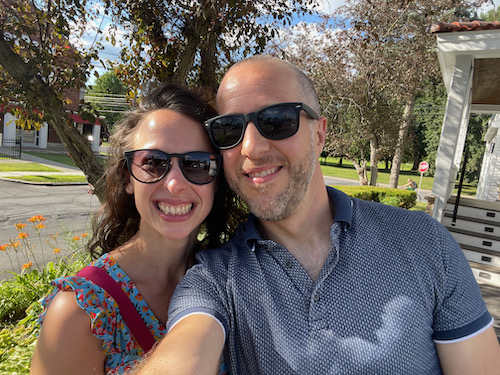Podcasting for Film or Podcasting with Films?
It’s true – the line between TV, film, apps, and media is blurring. Remember Quibi, the short-form (and short-lived) micro-stories app featuring Hollywood talent? The value proposition was a convergence of Netflix and Clubhouse (without the IPs of the former or the scarcity and community of the latter). Quibi tried to blend short attention spans with a long back catalog positioned behind a paywall without actively involving the user. While no media (or mediums) lives in a vacuum, all media (and mediums) co-exists and can, if integrated properly, cohabitate. Podcasting is no exception. Podcasting can certainly benefit from the presence or companionship of a film or TV show — A Date with Dateline, for example — and so, too, can a film or TV show benefit from the presence or companionship of a podcast. Today, any media is less and less about a singular channel and more and more about the ecosystem.
For a podcast to support a film or TV series, a co- or companion podcast could be approached in a number of ways. The following are three possible creative treatments that could be used independently or in combination.
Podcasting, Filmmaking, and the Possibility of Companion-Pieces
-
- The movie / podcast co-productions. In this scenario, two adaptations of the same story would be produced, one for video and one for audio-only.
- Let’s call this the Homecoming approach, based on the Gimlet/Amazon Prime productions.
- This scenario requires two treatments of one novel or short story. One treatment would be an immersive audio experience while the other would be the screenplay/teleplay.
- For this to work, the podcast treatment would need to be of exceptional audio quality and sound design, pulling heavily from the film medium (think priming the audience).
- The podcast would also be produced and released first. The purpose of an earlier release is tied to the purpose of the podcast – to develop and nurture an audience, heightening the value of the film/TV IP.
- The film/TV release would follow the podcast’s release and could include a bigger, A-list cast. The cast of the podcast would still benefit from attaching Hollywood talent to the production — think Sandra and Homecoming — but could be less known talent.
- The value in a serialized podcast approach is the binge-factor. Like a TV show, each episode will end with hooks to keep people listening until the end of the series.
- Most of all, the intent behind a podcast in this scenario is to develop an audience in anticipation of the film’s release.
- POSITIVES of this approach:
- IP name recognition prior to a film and/or TV series release.
- Proof of concept prior to a film/TV investment.
- A secondary experience for film or podcast viewers to consume after the first, creating an ecosystem of content and engagement.
- If the podcast is supported by sponsorship and/or secondary products, this could be an opportunity for continued revenue.
- The podcast feed could be further developed with extra content, such as: bonus content, director commentary, actor commentary, production commentary, and/or further productions.
- The podcast could be parlayed into another IP using a brand.
- POTENTIAL CHALLENGES: like any book to movie adaptation, some audience attrition is likely. Podcasts are more like books than films in consumption. They are visualized within the imagination. The film representation, therefore, might not match up with the picture in any given audience member’s head.
- The movie / podcast companion productions. In this treatment, the podcast is a supplement to the film/TV adaptation and would be released either after or concurrently. This approach would be best suited for a TV series adaptation with episodes dripped weekly. The podcast could come out the following day and continue to engage audiences while they wait for the next episode.
- Example of this approach: The Chernobyl Podcast by HBO. Peter Sagal, host of NPR’s Wait, Wait…Don’t Tell Me! co-hosted this series with the writer/producer of the HBO show, including extended commentary and interviews with leading actors.
- As mentioned above, this treatment could be an extension of the co-production strategy, continuing the feed with additional content once the film/TV version is released
- Immersive Audiobook-esque format with short stories. The challenge with podcasting is that while it is similar to an audiobook, it works best when it feels personal, conversational, and off-the-cuff. Therefore, adapting short stories for (or selecting short stories from) a first person, radio-drama perspective would likely translate best. At the very least, adding embellishments like music and sound-design will help with the immersive and personal nature of the medium.
- A Levar Burton Reads approach could be taken, employing A-list talent to read their favorite stories.
- A combined reading and didactic approach to the work might also be of interest to an audience. Perhaps an episode is one part story and one part opinion/digest of what the story means to the speaker. Education is a large draw of podcasting.
- A CHALLENGE TO THIS APPROACH: podcasting benefits from the repetition of a familiar host (or character, in terms of fiction). Changing the talent, no matter how high-profile they might be, will be a liability to continued listening. A familiar, recurring host, like Levar Burton or Ira Glass, will heighten a sense of trust for a listener, encouraging them to return each week.
- The movie / podcast co-productions. In this scenario, two adaptations of the same story would be produced, one for video and one for audio-only.
These are just a few ways that podcasting can support film and TV or vice versa. As podcasting continues to evolve, more opportunities (and examples) will likely become available.
